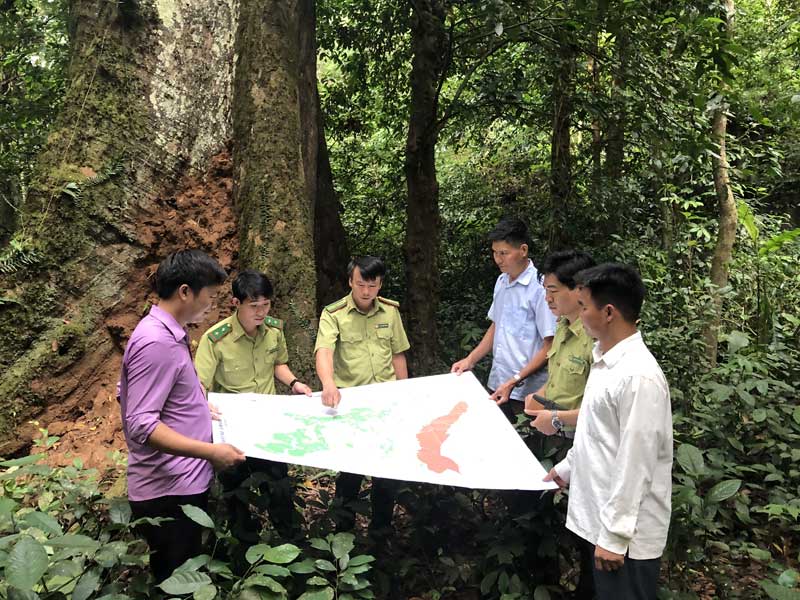
(HBO) - Setting foot in the primary forest in Nhuoi village, Da Phuc commune of Yen Thuy district, our tiredness seemed to fade away. Under the shadow of old-growth trees, the air was fresh and cool. It was just 2 o’clock in the afternoon, but Truong Duc Hoa, a forest ranger of Da Phuc reminded us to quickly do our reporting as dawn would fall quickly in the forest.
 Forest management
force in Yen Thuy district has kept a close watch on local forests, while
coordinating with the local Party Committee and government to manage, protect
and develop the forests.
Forest management
force in Yen Thuy district has kept a close watch on local forests, while
coordinating with the local Party Committee and government to manage, protect
and develop the forests.
Entering the centre of the forest, we were overwhelmed by the
towering Cho Chi (Parashorea chinensis) trees which are hundreds of years old.
The diameter of the trees’ trunks was nearly 2m, while their foots were so big
that 7 - 8 people extending their arms could not circle around them. Indeed, 13
Parashorea chinensis trees in Da Phuc forest deserved the title of national
heritage trees. The primary forest in Nhuoi village covers more than 30
hectares, with its core area spanning nearly 10 hectares.
In order to protect and develop the forest in Nhuoi village
and the whole commune in general, over the year, the Party Committee and
government of the commune have joined hands with all sectors, mass organisations
and forest management force to promote communication work to enhance public
awareness about and sense of responsibility towards forest management and
protection.
Meanwhile, regulations and rules on coordination in forest
protection have been built, together with the signing of commitments with local
households. At the same time, forest protection teams have been set up
to perform regular patrol and inspect the forest, thus quickly detecting
violations to forest resources.
Irrigation works in the locality have been exploited
efficiently thanks to the strict protection of watershed forests and the
reduction of barren land due to forestry economic development movements.
The resources from the forest have helped Da Phuc form a
commercial goods production region. Currently, the commune has over 650
hectares of material sugar canes and nearly 200 hectares of solanum trilobatum.
Particularly, with the untouched and attractive natural
landscapes that are protected by locals, the primary forest is expected to help
Da Phuc develop ecotourism to attract domestic and foreign visitors, creating a
breakthrough in the economic structure transformation in the locality./.
The Standing Board of the Hoa Binh provincial Party Committee has agreed in principle on a proposal by the Standing Board of the Party Committee of Hoa Binh city to gather feedback on the city’s 1:2000 zoning plan, which forms part of its broader urban development strategy.
Hoa Binh province has made notable progress in public administration reform and digital government development, with the satisfaction index among citizens and businesses reaching over 84%, according to recent government evaluations.
Thanks to great efforts by local authorities in recent times, the governance and public administration performance of Mai Chau district has been significantly improved.
In the afternoon of June 6, the Party Committee, the People's Council, the People's Committee and the Fatherland Front of Lac Son district solemnly held a meeting to celebrate the 139th anniversary of the district's founding (1886–2025) and the 79th anniversary of the establishment of the district's Party Committee (1946–2025). There was the attendance of Mr. Bui Van Thang, the Vice Chairman of the Provincial People's Council; Mr. Quach Tat Liem, the Vice Chairman of the Provincial People's Committee; Ms. Dang Bich Ngoc, the Deputy Head of the National Assembly Delegation of the province; as well as the former leaders of the province and district through various periods, who are the natives of the district.
Implementing the Politburo’s Resolution No. 57-NQ/TW on breakthroughs in science – technology, innovation, and digital transformation is a golden opportunity for the northern mountainous province of Hoa Binh to renew growth model, improve competitive edge and shorten digital gap.
Resolution 57-NQ/TW, issued by the Politburo on December 22, 2024, identifies sci-tech, innovation, and digital transformation as strategic breakthroughs to build a developed and prosperous nation. In Hoa Binh province, this spirit is not just a slogan, it’s being put into action through concrete initiatives that form a "new development triangle”: digital citizenship, digital economy, and digital administration.



 Forest management
force in Yen Thuy district has kept a close watch on local forests, while
coordinating with the local Party Committee and government to manage, protect
and develop the forests.
Forest management
force in Yen Thuy district has kept a close watch on local forests, while
coordinating with the local Party Committee and government to manage, protect
and develop the forests.